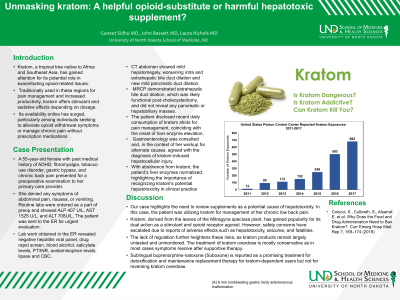Tuesday Poster Session
Category: Liver
P4822 - Unmasking Kratom: A Helpful Opioid-Substitute or Harmful Hepatotoxic Supplement?
Tuesday, October 29, 2024
10:30 AM - 4:00 PM ET
Location: Exhibit Hall E

Has Audio

Guneet Sidhu, MD
University of North Dakota
Fargo, ND
Presenting Author(s)
Award: Presidential Poster Award
Guneet Sidhu, MD1, John Bassett, MD, FACG2, Laura Nichols, MD2
1University of North Dakota, Fargo, ND; 2Sanford Health, Fargo, ND
Introduction: Kratom, a tropical tree native to Africa and Southeast Asia, has gained attention for its potential role in exacerbating opioid-related issues. Traditionally used in these regions for pain management and increased productivity, kratom offers stimulant and sedative effects depending on dosage. Its availability online has surged, particularly among individuals seeking to alleviate opioid withdrawal symptoms
Case Description/Methods: 55-year-old female with past medical history of ADHD, fibromyalgia, gastric bypass presented for preoperative examination to her primary care provider. She denied any symptoms of abdominal pain, nausea, or vomiting. Routine labs were ordered as a part of preop and showed ALP 407 U/L, AST 1525 U/L, and ALT 708U/L. The patient was sent to the ER for urgent evaluation. Lab work obtained in the ER revealed negative hepatitis viral panel, drug rapid screen, blood alcohol, salicylate levels, PT/INR, acetaminophen levels, lipase and CBC. CT abdomen showed mild hepatomegaly, worsening intra and extrahepatic bile duct dilation and new mild pancreatic duct dilation. MRCP demonstrated extrahepatic bile duct dilation, which was likely functional post-cholecystectomy, and did not reveal any pancreatic or hepatobiliary masses. The patient disclosed recent daily consumption of kratom shots for pain management, coinciding with the onset of liver enzyme elevation. Gastroenterology was consulted and, in the context of her workup for alternate causes, agreed with the diagnosis of kratom-induced hepatocellular injury. With abstinence from kratom, the patient’s liver enzymes normalized, highlighting the importance of recognizing kratom's potential hepatotoxicity
Discussion: Our case highlights the need to review supplements as a potential cause of hepatotoxicity. In this case, the patient was utilizing kratom for management of her chronic low back pain. Kratom, derived from the leaves of the Mitragyna speciosa plant, has gained popularity for its dual action as a stimulant and opioid receptor agonist. However, safety concerns have escalated due to reports of adverse effects such as hepatotoxicity, seizures, and fatalities. The lack of regulation further heightens these risks, as kratom products remain largely untested and unmonitored. The treatment of kratom overdose is mostly conservative. Sublingual buprenorphine-naloxone (Suboxone) is reported as a promising treatment for detoxification and maintenance replacement therapy for kratom-dependent users but not for reversing kratom overdose
Disclosures:
Guneet Sidhu, MD1, John Bassett, MD, FACG2, Laura Nichols, MD2. P4822 - Unmasking Kratom: A Helpful Opioid-Substitute or Harmful Hepatotoxic Supplement?, ACG 2024 Annual Scientific Meeting Abstracts. Philadelphia, PA: American College of Gastroenterology.
Guneet Sidhu, MD1, John Bassett, MD, FACG2, Laura Nichols, MD2
1University of North Dakota, Fargo, ND; 2Sanford Health, Fargo, ND
Introduction: Kratom, a tropical tree native to Africa and Southeast Asia, has gained attention for its potential role in exacerbating opioid-related issues. Traditionally used in these regions for pain management and increased productivity, kratom offers stimulant and sedative effects depending on dosage. Its availability online has surged, particularly among individuals seeking to alleviate opioid withdrawal symptoms
Case Description/Methods: 55-year-old female with past medical history of ADHD, fibromyalgia, gastric bypass presented for preoperative examination to her primary care provider. She denied any symptoms of abdominal pain, nausea, or vomiting. Routine labs were ordered as a part of preop and showed ALP 407 U/L, AST 1525 U/L, and ALT 708U/L. The patient was sent to the ER for urgent evaluation. Lab work obtained in the ER revealed negative hepatitis viral panel, drug rapid screen, blood alcohol, salicylate levels, PT/INR, acetaminophen levels, lipase and CBC. CT abdomen showed mild hepatomegaly, worsening intra and extrahepatic bile duct dilation and new mild pancreatic duct dilation. MRCP demonstrated extrahepatic bile duct dilation, which was likely functional post-cholecystectomy, and did not reveal any pancreatic or hepatobiliary masses. The patient disclosed recent daily consumption of kratom shots for pain management, coinciding with the onset of liver enzyme elevation. Gastroenterology was consulted and, in the context of her workup for alternate causes, agreed with the diagnosis of kratom-induced hepatocellular injury. With abstinence from kratom, the patient’s liver enzymes normalized, highlighting the importance of recognizing kratom's potential hepatotoxicity
Discussion: Our case highlights the need to review supplements as a potential cause of hepatotoxicity. In this case, the patient was utilizing kratom for management of her chronic low back pain. Kratom, derived from the leaves of the Mitragyna speciosa plant, has gained popularity for its dual action as a stimulant and opioid receptor agonist. However, safety concerns have escalated due to reports of adverse effects such as hepatotoxicity, seizures, and fatalities. The lack of regulation further heightens these risks, as kratom products remain largely untested and unmonitored. The treatment of kratom overdose is mostly conservative. Sublingual buprenorphine-naloxone (Suboxone) is reported as a promising treatment for detoxification and maintenance replacement therapy for kratom-dependent users but not for reversing kratom overdose
Disclosures:
Guneet Sidhu indicated no relevant financial relationships.
John Bassett indicated no relevant financial relationships.
Laura Nichols indicated no relevant financial relationships.
Guneet Sidhu, MD1, John Bassett, MD, FACG2, Laura Nichols, MD2. P4822 - Unmasking Kratom: A Helpful Opioid-Substitute or Harmful Hepatotoxic Supplement?, ACG 2024 Annual Scientific Meeting Abstracts. Philadelphia, PA: American College of Gastroenterology.

